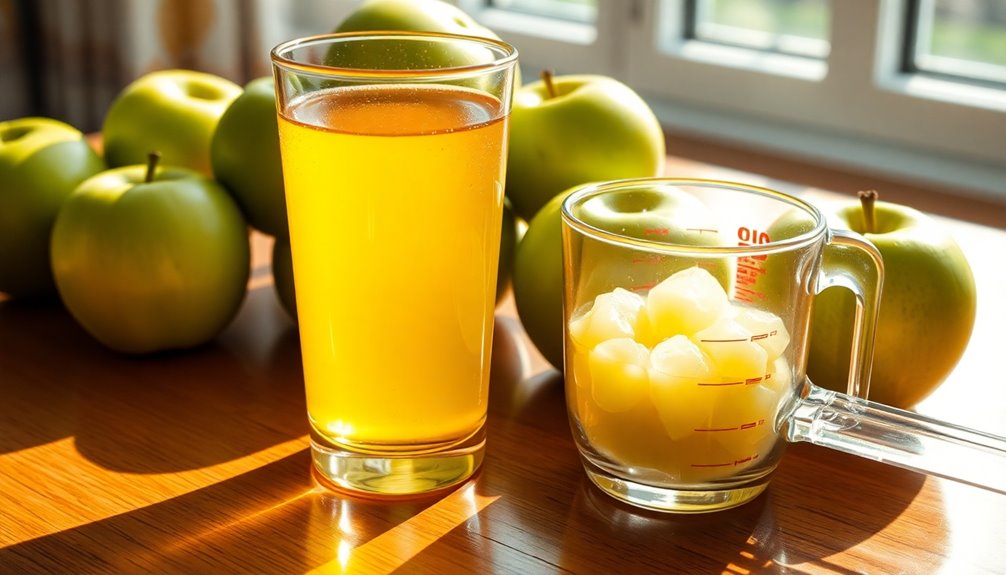Apple juice packs a significant carbohydrate punch, with a standard 473mL bottle containing about 53 grams. Most of these carbs come from natural sugars found in apples. A smaller ½ cup serving (120mL) has around 17 grams of carbs. While it can be refreshing, the high sugar content and low fiber may impact your blood sugar levels and calorie intake. Want to know more about its health effects and how to enjoy it wisely?
Key Takeaways
- A standard 473mL bottle of apple juice contains approximately 53 grams of carbohydrates.
- A ½ cup (120mL) serving has around 17 grams of carbohydrates.
- The carbohydrates primarily come from natural sugars found in apples.
- Apple juice has a glycemic load of about 10.6, indicating a moderate impact on blood sugar levels.
- Moderation is essential to enjoy apple juice while managing overall carbohydrate intake.

Have you ever wondered how many carbs are in apple juice? It's a common question, especially if you're paying attention to your dietary choices. When you crack open a bottle of apple juice, you might be surprised by the number of carbohydrates packed within. For a standard serving size of 1 bottle, which is about 473mL, you're looking at approximately 53 grams of carbohydrates. That's a significant amount and can impact your overall daily intake.
To break it down further, if you're sipping on a ½ cup serving—roughly 120mL—of cold-pressed apple juice, you'll find it contains around 17 grams of carbohydrates. The carbohydrate content largely comes from natural sugars, which are inherent in the apples themselves. In fact, the total sugars in apple juice can often exceed 20 grams per serving. While natural sugars are healthier than refined sugars, they still contribute to your daily calorie count.
Speaking of calories, apple juice is relatively high in them compared to whole fruits. A standard serving typically carries around 110 calories or more, depending on the brand and processing method. This can be a concern if you're watching your caloric intake, especially since apple juice is low in fiber. In an 8-ounce serving, you'll only find about 0.5 grams of dietary fiber. This low fiber content means that the sugars are absorbed quickly into your bloodstream, which can spike your blood sugar levels.
This brings us to the glycemic load of apple juice, which stands at around 10.6. This figure indicates how much a particular food can raise your blood sugar levels after consumption. A glycemic load of 10.6 suggests that apple juice can have a moderate effect on blood sugar. If you have concerns about maintaining stable blood sugar levels, this is something to consider when making your dietary choices.
When evaluating the health impact of apple juice, it's essential to weigh the pros and cons. While it offers some vitamins and hydration, the high carbohydrate and sugar content combined with low fiber can be counterproductive for those looking to manage their weight or blood sugar levels effectively. Nutrition information is crucial here, as you'll want to balance the enjoyment of apple juice with its effects on your health.
Ultimately, if you love apple juice, moderation is key. You can still enjoy it as part of a balanced diet, but keep an eye on your serving sizes and overall carbohydrate intake. Being informed about what you consume helps you make smarter dietary choices, ensuring you get the most out of every delicious sip.
Frequently Asked Questions
How Many Carbs Are in an 8 Oz Glass of Apple Juice?
When you pour yourself an 8 oz glass of apple juice, you'll find it contains around 28 grams of total carbohydrates.
Out of those, about 23.9 grams are sugars. If you're watching your carb intake, keep in mind that the net carbs tally up to around 26.6 grams after considering fiber.
Can I Drink Apple Juice on a Low Carb Diet?
You can drink apple juice on a low carb diet, but you need to be cautious.
It's high in carbohydrates, and a single serving could take up a big chunk of your daily limit. If you really want to enjoy it, consider having just a small portion and balance it with other low-carb foods throughout the day.
Alternatives like water or unsweetened herbal teas can help keep your carb intake in check while keeping you hydrated.
How Many Carbs Are in a 4 Oz Glass of Apple Juice?
Did you know that a 4 oz glass of apple juice packs about 14 grams of carbs?
When you're sipping on this refreshing drink, you're mainly consuming natural sugars, which account for around 12-13 grams of that carbohydrate content.
Keep in mind, apple juice has little to no dietary fiber, so those carbs can hit your blood sugar quickly.
If you're watching your carb intake, you might want to consider portion control!
How Many Carbs Are in Martinelli's Apple Juice?
If you're curious about Martinelli's Apple Juice, you'll find it contains 28 grams of total carbohydrates per 8 fluid ounce serving.
Most of that, around 24 grams, comes from natural sugars found in apples. It's low in fat, too, with less than 0.5 grams.
While it offers no dietary fiber, this juice can be a refreshing way to hydrate and boost your carbohydrate intake throughout the day.
Conclusion
So, who would've thought that a simple glass of apple juice could pack a carb punch? With about 28 grams of carbs in just one cup, it's almost like nature's way of saying, "Surprise!" While you sip on that refreshing drink, remember you might be consuming more sugar than you bargained for. Maybe we should just stick to munching on whole apples instead—at least then, we can pretend we're being healthy while enjoying a snack!
Cindy thoroughly researches juicing trends, techniques, and recipes to provide readers with practical advice and inspiration. Her writing style is accessible, engaging, and designed to make complex concepts easy to understand. Cindy’s dedication to promoting the advantages of juicing shines through her work, empowering readers to make positive changes in their lives through the simple act of juicing.











